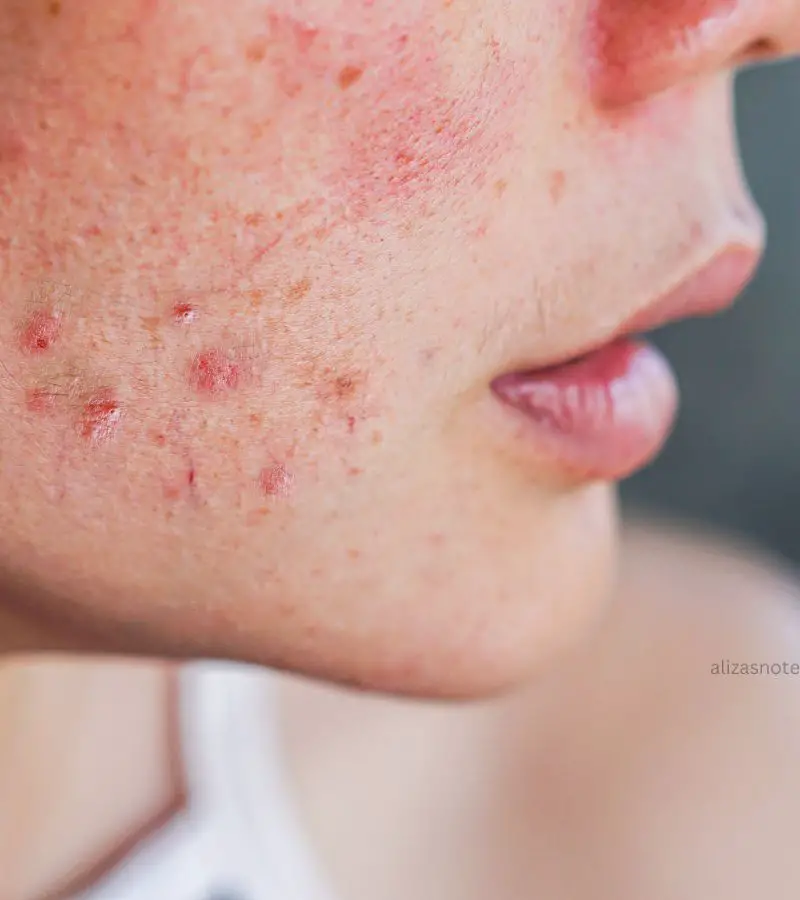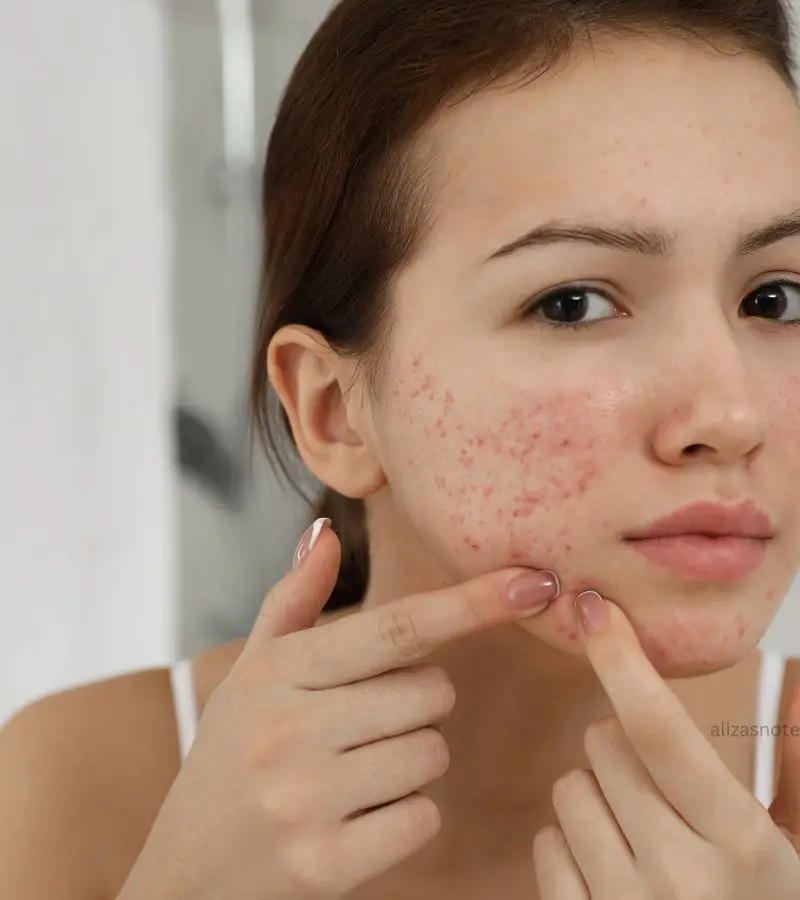Managing acne-prone skin can be both challenging and frustrating, especially when you’re trying to find an effective skincare routine that doesn’t break the bank.
But healthy skin doesn’t not too complicated or costly.
With the right products and consistent care, you can manage acne and maintain a radiant complexion without spending a fortune.
Get ready for an affordable skincare routine for acne prone skin that that works for you.
What Causes Acne-Prone Skin?
Acne-prone skin can be influenced by a variety of internal and external factors. Here are the main factors that contribute to acne-prone skin:
1. Hormonal Changes
Hormonal fluctuations are a major trigger for acne. During puberty, the body produces more androgens, which increase the size and activity of sebaceous (oil) glands, resulting in higher oil production and clogged pores. Hormonal changes can also occur during:
- Menstrual cycles
- Pregnancy
- Use of oral contraceptives
- Conditions like polycystic ovary syndrome (PCOS)
2. Genetics
Genetics play a significant role in determining your skin type and its response to various factors. Genetic predisposition can affect:
- Oil production
- Skin cell turnover rate
- Inflammatory response
3. Diet
While research on diet and acne is ongoing, certain foods may exacerbate acne in some individuals. Common dietary triggers include:
- High glycemic index foods: Sugary snacks, white bread, and other refined carbohydrates can spike blood sugar levels, leading to increased oil production.
- Dairy products: Milk and other dairy products have been linked to acne, possibly due to the hormones they contain.
4. Stress
Stress can worsen acne by increasing the production of stress hormones like cortisol. Elevated cortisol levels can result in:
- Increased oil production
- Inflammation
- Slower healing of existing acne
5. Skincare and Cosmetic Products
Using products unsuitable for your skin type can contribute to acne. Factors include:
- Comedogenic products: These can clog pores and lead to breakouts.
- Harsh ingredients: Overly drying or irritating products can disrupt the skin’s barrier, causing increased oil production and inflammation.
6. Bacteria
Certain bacteria on the skin, particularly Propionibacterium acnes (P. acnes), can contribute to acne development. These bacteria thrive in oily environments and can cause:
- Inflammation
- Pus formation in pimples
7. Environmental Factors
External factors such as pollution and humidity can affect the skin by:
- Clogging pores with dirt and toxins
- Increasing oil production
8. Poor Hygiene and Habits
Certain habits can worsen acne or contribute to its development, such as:
- Not cleansing the skin properly
- Frequently touching the face
- Using dirty makeup brushes or pillowcases
Through a explore affordable skincare routine for acne prone skin and lifestyle adjustments, you can help reduce breakouts and maintain healthier skin
Affordable Skincare Routine For Acne Prone Skin:
Managing acne-prone skin can be challenging, but it doesn’t have to be costly. Here’s an affordable skincare routine tailored for acne-prone skin.
1. Cleansing
Cleansing is the cornerstone of any skincare routine, especially for acne-prone skin. Cleanser that effectively makeup, removes dirt and oil without losing natural moisture.
Recommended Products
- CeraVe Foaming Facial Cleanser: Contains ceramides and niacinamide to help restore the skin’s barrier and calm irritation.
- Cetaphil Daily Facial Cleanser: A budget-friendly option that is gentle on the skin and helps control oil.
Tips for Effective Cleansing
- Use at morning and before bed.
- Use lukewarm water, not hot, to avoid irritating your skin.
- Dry skin naturally.
2. Exfoliating
Exfoliation helps remove dead skin cells and prevent clogged pores, which can lead to acne. Scrub your face at least once a week.
Recommended Products
- The Ordinary Salicylic Acid 2% Solution: Penetrates deep into the pores to unclog them and reduce acne.
- Pixi Glow: Finely exfoliate and sooth the skin.
Tips for Exfoliating
- Exfoliate 2-3 times a week to avoid over-exfoliating, which can cause irritation.
- Always keep hydrated your skin with moisturizing.
3. Toning
Toners help balance your skin’s pH and remove any leftover impurities after cleansing.
Recommended Products
- Thayers Witch Hazel Toner: Contains soothing aloe vera and Alcohol-free.
- The Ordinary Glycolic Acid 7% Toning Solution: Affordable and effective for gentle exfoliation and brightening.
Tips for Using Toner
- Apply toner with a cotton pad or your hands after cleansing.
- Let it absorb finely.
4. Treating
Using right treatments can assist address specific acne concerns. Look for products with proven acne-fighting ingredients.
Recommended Products
- Differin Gel (Adapalene 0.1%): A retinoid that helps prevent breakouts and improve skin texture.
- The Ordinary Niacinamide 10% + Zinc 1%: Reduces inflammation and controls sebum production.
Tips for Applying Treatments
- Apply treatments to clean, dry skin.
- Use tiny amount to affected areas.
5. Moisturizing
Moisturizing is crucial, even for acne-prone skin. Choose lightweight, non-comedogenic moisturizers.
Recommended Products
- Neutrogena Hydro Boost Water Gel: Oil-free and hydrates without clogging pores.
- CeraVe PM Facial Moisturizing Lotion: Contains ceramides and niacinamide to support the skin barrier.
Tips for Moisturizing
- Twice a day, ideal treating for skin.
- Consistency use at night may repair the skin while you sleep.
6. Sun Protection
Daily sun protection is essential to prevent sun damage and hyperpigmentation, especially if you’re using exfoliants or retinoids.
Recommended Products
- EltaMD UV Clear Broad-Spectrum SPF 46: Lightweight, non-comedogenic, and suitable for acne-prone skin.
- Neutrogena Clear Face Sunscreen SPF 55: Affordable and designed not to clog pores.
Tips for Applying Sunscreen
- Apply SPF everyday.
- Reapply every four hours if desire.
Extra Tips:
Here are some additional tips to effectively manage and prevent breakouts:
1. Maintain a Healthy Diet
- Balanced Nutrition: Eat a variety of fruits, vegetables, whole grains, and lean proteins to support overall skin health.
- Avoid High Glycemic Foods: Limit sugary snacks, white bread, and other refined carbohydrates that can spike blood sugar levels and potentially worsen acne.
- Monitor Dairy Intake: Some people find that reducing dairy consumption helps with their acne. Consider cutting back on milk, cheese, and other dairy products to see if it makes a difference.
2. Stay Hydrated
- Drink Plenty of Water: Staying hydrated helps flush out toxins and can improve your skin’s overall health and appearance.
- Limit Sugary and Caffeinated Beverages: Opt for water, herbal teas, and other hydrating options instead.
3. Practice Good Hygiene
- Change Pillowcases Regularly: Pillowcases can accumulate oil, bacteria, and dead skin cells. Change them regularly for clean sleeping environment.
- Clean Your Makeup Brushes: Dirty makeup brushes can harbor bacteria and contribute to breakouts. Clean your brushes regularly with a gentle cleanser or brush cleaner.
- Avoid Touching Face: It may transfer bacteria, dirt, and oil from your hands, leading to more breakouts.
4. Manage Stress
- Stress-Reducing Activities: Engage in activities like yoga, meditation, or regular exercise to help reduce stress.
- Adequate Sleep: Ensure you get enough sleep each night to help your body repair and rejuvenate, which can improve your skin’s health.
5. Avoid Over-Washing and Harsh Products
- Gentle Cleansing: Stick to washing your face twice a day with a gentle cleanser. Over-washing can break natural oils, and lead to produce more oil.
- Avoid Harsh Ingredients: Use gentle, non-irritating products that are suitable for acne-prone skin. Avoid ingredients that can be overly drying or irritating.
6. Be Consistent with Your Routine
- Patience and Persistence: Skincare results take time. Stick with your routine consistently and give your skin time to adjust and improve.
- Track Your Progress: Keep a skincare journal to note any changes or reactions to new products, that will works significantly for skin.
7. Seek Professional Advice
- Consult a Dermatologist: If over-the-counter products and homecare routines do not improve your acne, consider consulting a dermatologist. They can provide personalized advice, prescribe stronger treatments, and help identify any underlying conditions contributing to your acne.
Stick with your routine and give your skin the time it needs to improve.
FAQs:
Q. What is an affordable skin care routine for dry acne-prone skin?
For dry, acne-prone skin, a budget-friendly routine includes a gentle cleanser, hydrating toner, lightweight moisturizer, and non-comedogenic sunscreen. Look for products such as hyaluronic acid and ceramides.
Q. What are some affordable skin care products for acne prone skin?
Affordable skincare products for acne-prone skin include CeraVe Foaming Facial Cleanser, The Ordinary Niacinamide 10% + Zinc 1%, and Neutrogena Hydro Boost Water Gel. These products help manage oil, reduce inflammation, and maintain hydration.
Q. How often should exfoliate the acne-prone skin?
If you have acne-prone skin, it’s recommended to exfoliate 2-3 times a week using a gentle chemical exfoliant like salicylic acid or glycolic acid. This helps to remove dead skin cells and prevent clogged pores without causing irritation.
Q. Can I use natural remedies for acne-prone skin?
Yes, natural remedies like tea tree oil, aloe vera, and honey can be beneficial for acne-prone skin. Ensure you patch test these remedies first and use them alongside a proper skincare routine to avoid irritation.
Q. How can I prevent acne scars on a budget?
To prevent acne scars, avoid picking at pimples and use products containing niacinamide, vitamin C, and sunscreen. Affordable options include The Ordinary Niacinamide 10% + Zinc 1% and Neutrogena Clear Face Sunscreen SPF 55.
Read Other Pimples Care Write Up:
How to care pimples face
Use Aloe Vera for Pimple care
Turmeric and Honey for Acne care
Last call:
- Skincare is a personal journey, and everyone’s skin responds differently to various products. Be consistent, monitor your progress, and make your routine as needed.
- If over-the-counter products aren’t sufficient, consider consulting a dermatologist for personalized advice.
Call to action:
- We hope our guide to an affordable skincare routine has provided you with helpful and budget-friendly tips for achieving clearer, healthier skin. Now, we want to hear from you!
- For more skincare tips, product recommendations, and inspiration, join us on Pinterest.



